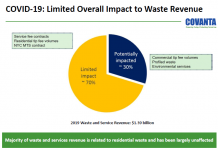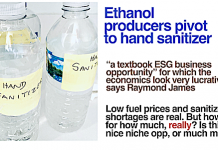by Debra Fiakas CFA
The drumbeat of deals in the ethanol industry is sounding louder, or so it seems from the proliferation of notices in my e-mail inbox. I received no less than four messages in one morning from ethanol producer Green Plains, Inc. (GPRE: Nasdaq) heralding the purchase of the Hopewell Ethanol plant in Virginia from FutureFuel, Inc. (FF: NYSE). The acquisition represents the ninth transaction for Green Plains in the last five years, adding another 60 million gallons in annual production capacity to Green Plains’ existing total capacity of 1.02 billion gallons.
Indeed, Green Plains is among the largest ethanol producers in the U.S. with a total of thirteen plants in operation. Notably only four of these facilities were ‘greenstarts’ by Green Plains, making it clear that deal making is a critical element in success in the ethanol business. Green Plains is successful in financial terms. In the most recently reported twelve months the company reported a total of $3.2 billion in total sales, providing $88.5 million in net income or $2.22 per share. Green Plains squeezed $93.7 million in operation cash flow out of sales in that period. Granted Green Plains has some debt that must be serviced – $652.4 million at the end of June 2015 – that represents a debt-to-equity ratio of 80.80. However, imagine the debt load that might be required to build over a billion gallons of production capacity if Green Plains management was not on the prowl for bargains from plant owners anxious to exit a difficult business in a period of declining commodity prices.
It might be unfair to characterize FutureFuel as ‘anxious.’ While considerably smaller than Green Plains, FutureFuel is also comfortably profitable. Sales of $350.3 million in the twelve months ending June 2015 provided $53.5 million in net income and $84 million in operating cash flow. What is more, FutureFuel has a pristine balance sheet with no debt and a cash hoard of $228.3 million in cash. Of course, FutureFuel’s financial success is due in part to the company’s shift in focus away from ethanol production to higher margin specialty and performance bio-chemicals. FutureFuel just announced the renewal of a deal to supply Proctor & Gamble (PG: NYSE) with a proprietary bleach activator laundry detergent additive known by the acronym NOBS. FutureFuel has a string of long-term supply agreements to make custom or proprietary bio-based chemicals that are used in herbicides, coatings, adhesives and other industrial, pharmaceutical and agricultural end-products. To be sure, FutureFuel is still in the biodiesel business with a fat and oil processing plant that has the capacity to turn out 58 million gallons of biodiesel per year.
Ethanol may no longer be central to FutureFuel’s business plan, but it is still on the radar of Green Plains and others. The economics of ethanol can be made more attractive by leveraging low-cost raw material supply relationships and efficient distribution pacts for the ethanol and the many by-products associated with corn feedstock. Capital assets purchased at good values can put icing on the cake.
Green Plains has some competition for ethanol assets. Flint Hills Resources, the subsidiary of privately-held Koch Industries, has been in the hunt over the past few years as well. Indeed, Flint Hills has established its ethanol production footprint exclusively with acquisitions. Just five years ago Flint Hills was in the business of refining fossil fuels and producing petrochemicals. Eight ethanol deals over the past five years have given the company a presence in Iowa, Nebraska and Georgia and a total of over 650 million gallons in ethanol product capacity per year. Importantly for Flint Hills Resources and its parent Koch Industries, the company can also claim a berth in the renewable fuel sector.
An interesting study could be made of the twin timelines of the Flint Hills Resources investment in ethanol production and political contributions by the Koch brothers in organizations denying the impact of fossil fuels in creating adverse climate change. However, that would be beyond the scope of a article looking at the impact of mergers and acquisitions on the fate of the ethanol sector.
It seems ethanol has always been in a state of consolidation. Green Plains and Flint Hill Resources are just borrowing from the playbook of POET, LLC based in South Dakota. POET was previously known as Broin Companies and was founded in the early 1980s. Its first plant was gobbled up in a foreclosure as the initial ethanol plants of the 1970s struggled against falling gas prices. POET has made numerous acquisitions since, building production capacity to 1.7 billion gallons per year in twenty-seven plants located in South Dakota, Minnesota, Iowa, Indiana, Michigan, Missouri and Ohio. It is questionable whether POET could have achieved that level of scale and remained in business by pursuing a strategy of new construction alone.
That is not to say that POET is not game to build a new plant. POET expanded capacity at that first ethanol plant and constructed a half dozen other ethanol facilities within the first two decades of the company’s history. More recently, in a joint venture with Royal DSM, POET brought on-line in 2014, a commercial-scale plant to produce 25 million gallons per year of cellulosic ethanol from corn cobs and other crop residue. The plant had an $8 million price tag paid for out of proceeds from a government guaranteed loan.
We are left to guess on the financial success of POET and Flint Hills Resources. As private companies they need not disclose sales or earnings details. We are left to guess whether the economics of consolidation are working in their favor as well as they have for Green Plains. The longevity of POET suggests it is effective to ‘buy low’ in the ethanol business, proving that sector consolidation could also be its salvation.
Debra Fiakas is the Managing Director of Crystal Equity Research, an alternative research resource on small capitalization companies in selected industries.
Neither the author of the Small Cap Strategist web log, Crystal Equity Research nor its affiliates have a beneficial interest in the companies mentioned herein. GPRE, FF and POET are all included in the Ethanol Group of Crystal Equity Research’s Beach Boys Index of companies using the power of the sun to create renewable fuels.








